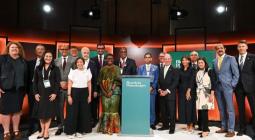Washington to bolster influence in developing countries with $2B in climate support
After being outpaced in recent years by China and the European Union (EU) in the field of climate investments in developing countries, the United States of America is making a comeback. Joe Biden's administration has announced the mobilisation of 2.3 billion dollars from American multinationals to accelerate the ecological transition in Africa, the Middle East and Latin America.
The United States of America, the world’s leading economic power, wants to reassert its leadership in developing countries, including in the climate field at a time when Europe and China are stealing the show in green partnerships. As a result, the White House will be raising up to 2.3 billion dollars from the US private sector from 2024. These funds will be used primarily to implement the President’s Emergency Plan for Adaptation and Resilience (PREPARE).
This window aims to combat climate change, but above all to make Washington DC the leading climate investor at a time when most northern countries and their polluting multinationals are continuing to shirk their contributions to the “loss and damage” fund ratified at the 28th United Nations Climate Conference (COP28) held in Dubai in November 2023. The 2.3 billion dollars that will be generated by American multinationals, including the world’s largest banking and industrial groups, will go directly to the countries in Africa, Latin America and the Middle East that are most vulnerable to natural disasters.
According to the United States Agency for International Development (USAID), the initiatives to be implemented will focus on the expansion of climate information and early warning systems, the introduction of new financial products and services such as eco-responsible insurance, and innovations for intelligent food systems. At least “31 companies and partners have already responded to our call to action, including around ten since the launch in 2022. They include Google, Gro Intelligence, Mastercard, Marsh McLennan, Meta, Microsoft, Pegasus Capital Advisors, PepsiCo, SAP and WTW (formerly Willis Towers Watson)”, says USAID.
American leadership focused on the ecological transition in Africa
The 21 other American companies that have joined the concept include Xylem. The New York-based water management company will not necessarily be contributing capital, but rather its technological expertise to “mitigate water scarcity, reduce water loss and optimise water supply systems to improve affordability”. According to the American authorities, the solutions developed by this structure will be effective in tackling the water stress, water pollution and flooding that are holding back sustainable development south of the Sahara.
The commitment of the United States of America to support climate change mitigation and adaptation in developing countries does not stop there. The US government is currently preparing a $53 million allocation that will be earmarked for “new low-carbon and resilient activities” in 23 cities in Asia, Africa, Latin America and the Caribbean, according to USAID. As part of this initiative, the municipalities of Hermosillo in Mexico and Mbombela in South Africa will benefit from decarbonisation infrastructures, including electric vehicles for public transport and buildings constructed on the principles of energy efficiency.
Cover photo: By AFRIK21





